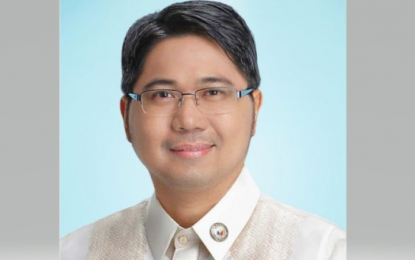
House Committee on Overseas Workers Affairs chairperson Ron Salo (File photo)
MANILA – A House leader on Wednesday said the Department of Migrant Workers (DMW) intends to resume labor talks with Kuwait for the possible lifting of the deployment ban of overseas Filipino workers (OFWs) to the Gulf state.
In a Bagong Pilipinas Ngayon briefing over PTV4, House Committee on Overseas Workers Affairs chairperson Ron Salo said high-level discussions between the two governments centered on the OFW deployment suspension are expected to resume.
The DMW, through Advisory No. 5, suspended the deployment of first-time OFWs bound for Kuwait in February 2023 following the murder of overseas Filipino worker, Jullebee Ranara.
Kuwaiti authorities likewise imposed a restriction in response to the Philippines' deployment ban of new household workers bound for Kuwait.
"Nais ko pong ipaalam po sa inyo na in-inform po tayo ng DMW na magri-resume na ulit iyong kanilang pag-uusap. Nagpapasalamat po tayo kay Secretary Hans Cacdac ng DMW sapagkat iyong panawagan po natin ay pinakinggan din naman po kaagad; nakikita po natin kung gaano rin po sila nagmamalasakit sa mga kababayan po natin (I'd like to announce that the DMW informed me that they will resume discussions [on the deployment ban]. We are grateful to DMW officer-in-charge Undersecretary Hans Cacdac for listening to our appeal. We also recognize their compassion for our OFWs)," Salo said.
Salo said he would personally visit Kuwait to help with the bilateral discussions between the two countries.
Salo added that even as a legislator, he had difficulty obtaining a visa, let alone average Filipinos.
"Na-delay po iyong release po ng visa po natin when it used to be wala pong requirement na katulad po ng pag-secure ng visa sa mga katulad po natin na legislators. Pero dahil po dito sa existing ban na ito, pati po tayo ay hindi nakapunta (The release of my visa was delayed when there used to be no requirements like securing a visa for us legislators. But due to the existing ban, I was unable to go earlier)," he said.
"Pero iisa lang ang ibig sabihin po nito – kung po tayo mismo na kongresista ay naapektuhan po at hindi po ma-isyuhan po ng visa, so much more doon sa mga kababayan po natin (This means one thing --if lawmakers are affected and are not issued visas promptly, how much more for our OFWs)," he added.
Salo said there are about 260,000 OFWs in Kuwait.
Meanwhile, Salo said OFWs in Kuwait who have violated residency laws should take advantage of the March-June amnesty period to either adjust their status or voluntarily depart the Gulf country without penalties.
He warned that overstaying OFWs who fail to avail of the Kuwaiti government’s amnesty program might face arrest, deportation, or permanent prohibition from entering Kuwait.
Salo said the DMW is ready to assist them with the amnesty process, including securing new passports at the Philippine embassy in case these expire.
"I understand, may mga lumapit na po sa DMW para magpa-assist, at kasalukuyan pong ina-assist po sila ng ating DMW. Kaya panawagan po natin sa lahat po ng mga kababayan natin ay siguraduhin po nila na makapag-apply po sila sa ganitong amnesty program (There are some OFWs who have already contacted the DMW for assistance, and the DMW is currently assisting them. That's why I urge all our OFWs in Kuwait to apply for the amnesty program)," he said.
"Otherwise, kapag nalampasan po sila nito, hindi na po sila magiging valid or allowed na mag-avail and later on ay puwede po silang ipa-deport immediately sa Pilipinas at hindi na rin po sila makakabalik po roon, maba-blacklist po sila (Otherwise, if they miss this chance, they will not be allowed to avail of the amnesty later on or they could be immediately deported back to the Philippines with no prospect re-entering Kuwait because they might be blacklisted)," he added.
Aside from the DMW, Salo said he is also coordinating with the Overseas Workers Welfare Administration (OWWA), Department of Foreign Affairs (DFA), and recruitment agencies in the private sector to help OFWs avail of the amnesty.
On March 14, the Kuwait Interior Ministry announced the three-month amnesty period from March 17 to June 17 for foreigners with residency violations, specifically those whose civil identification cards have expired or been canceled.
Under the amnesty, foreigners who illegally stay in Kuwait, including their family members, but wish to continue their residency may adjust their immigration status provided they pay for overstaying fines and comply with other requirements.
The interior ministry said residency fines are set at two Kuwaiti dinar per day, equivalent to about PHP365.
Protecting Filipino seafarers
Salo said the DMW has reiterated its support for the proposed Magna Carta of Filipino Seafarers in a letter dated March 6, 2024.
He said the proposed legislation would institutionalize crucial safeguards on the rights of Filipino seafarers, as well as their obligations.
"Diyan nakapaloob ang mga karapatan ng mga seafarers po natin dito sa panukalang batas po na ito. Karapatan po nila… at the same time iyong minimum salary na puwede po nilang tanggapin, ano po iyong mga other benefits kagaya po ng repatriation (The proposed law provides for the rights of our seafarers… at the same time, it also stipulates the minimum salaries and benefits, including repatriation)," he said.
Salo said key highlights of the Magna Carta include proper recognition of Filipino seafarers, ensuring their welfare, safety, and fair treatment both domestically and internationally.
Additionally, the legislation institutionalizes decent working conditions and emphasizes enhanced training and education to further strengthen the maritime industry.
It also identifies the various roles of both the public and private sectors in ensuring that the objectives of the law are fully realized, he added. (PNA)
